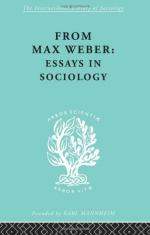|
This section contains 8,011 words (approx. 27 pages at 300 words per page) |

|
SOURCE: "Critical Remarks on Weber's Theory of Authority," in The American Political Science Review, Vol. LVII, No. 2, June, 1963, pp. 305-16.
Originally delivered as a lecture at the Annual Meeting of the American Political Science Association in 1962, the following essay examines the role of authority and bureaucracy in Weber's sociology.
Max Weber has often been criticized for advocating a wertfrei, ethically neutral approach in the social sciences and for thereby denying to man, in the words of Leo Strauss, "any science, empirical or rational, any knowledge, scientific or philosophic, of the true value system." On the other hand, Carl Friedrich points out that Weber's "ideal-type analysis led him to introduce value judgments into his discussion of such issues as bureaucracy." There is some justification for both these criticisms. Indeed, a characteristic of Weber's work is that it can be and has been subjected to opposite criticisms, not only in...
|
This section contains 8,011 words (approx. 27 pages at 300 words per page) |

|


